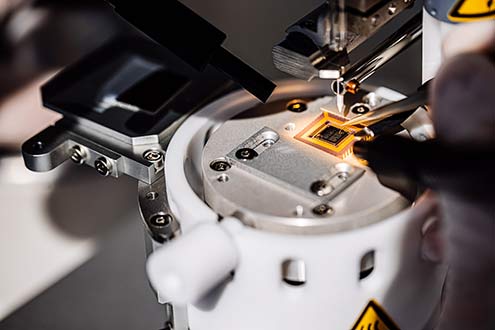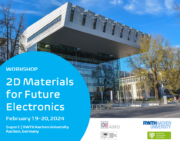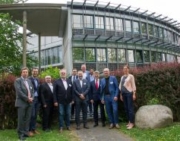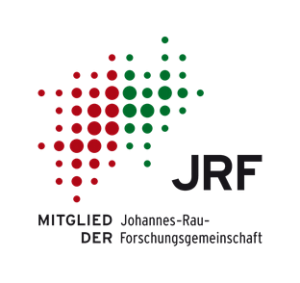Discussing the future with a member of the Bundestag
On Monday, August 10, 2020, AMO GmbH received the visit of Rudolf Henke, member of the German parliament (Bundestag).
Henke – who is a physician and president of the North-Rhine Medical Association – is a member of the German parliament since 2009, directly elected for the city of Aachen with the Christian Democratic Union (CDU). Among other duties, he is full member of the Health Committee and deputy member of the Committee on Education, Research and Technology Assessment.
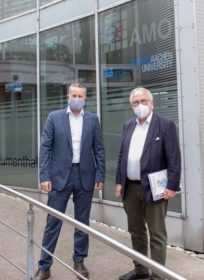
Max Lemme (left) and Rudolf Henke (right) in front of the AMO building.
A major topic of discussion during his visit has been the Clusters4Future Initiative and in particular the Cluster NeuroSys, coordinated by Prof. Max Lemme. The goal of NeuroSys is to establish the Aachen region as the world’s leading location for research, development and innovation of neuromorphic hardware for artificial intelligence, by bundling in the region all competencies and infrastructures required for the development of future European AI hardware.
At the algorithm level, artificial intelligence (AI) already dominates areas such as computer vision and language processing, and its role in our everyday life is going to increase rapidly in the future. But it is already clear that traditional computer hardware is hitting inherent limits when it comes to AI, and that applications such as autonomous driving, personalized healthcare, smart cities, and Industry 4.0 will require innovative hardware concepts.
The need for new AI hardware becomes all the more clear when one looks at the energy consumption and the CO2 footprint associated to AI: today, the training of a large neural network emits almost as much CO2 as five cars over their entire life cycle [1]. The goal of NeuroSys to transform the excellent fundamental research done in Aachen and at Research Center Jülich on neuromorphic materials, devices and algorithms into the technological basis for neuro-inspired hardware. New computer chips that will enable a leap in energy efficiency.
While the nucleus of the NeuroSys initiative is formed by the RWTH Aachen University, Research Center Jülich and AMO GmbH, the initiative extends far beyond these research institutions: it involves the City and the Urban Region of Aachen, and numerous start-ups, local tech companies and international industry with offices and research centers in the region.
“It is great to see a knowledgeable and sincere representative of our democracy reaching out to discuss the future”, says Lemme after the visit of Henke. “It is clear that Germany will only be able to compete in the increasingly tough global competition if it is able to develop and deploy its own AI hardware. The competition is very tough, but a united Europe has the capabilities, the resources and also, I think, the responsibility to be world leaders in neuromorphic hardware for AI. I believe that we have to consider not just AI technology, but also its ethical and societal implications: where and how should it be applied? How can we transform into a society where machines will be able to take over certain tasks? How can we do that while keeping the social balance in our society? NeuroSys intends to be the nucleus for all of this.”
[1] E. Strubell, A. Ganesh, and A. McCallum, Energy and Policy Considerations for Deep Learning in NLP, arXiv:1906.02243 (2019).

